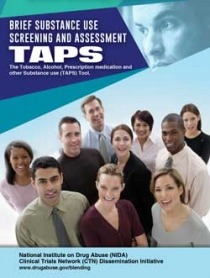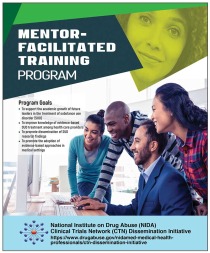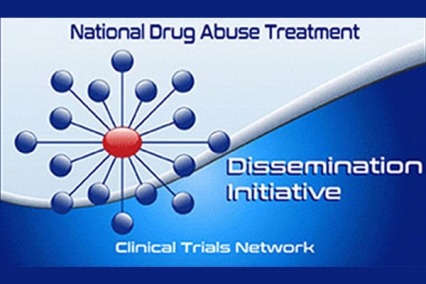
About the CTN DI Initiative
The CTN Dissemination Initiative aims to reduce the gap that exists between the publication of research on treatment of substance use disorders and implementation in clinical practice. It incorporates collaboration among clinicians, researchers, and experienced trainers to develop user-friendly tools and products to facilitate the adoption of research-based interventions into clinical settings. Explore this page for more information about the different components of the CTN Dissemination Initiative.
For more information about NIDA's recent dissemination efforts related to adolescent health visit: National Institute on Drug Abuse: Dissemination of Scientific Knowledge to Improve Adolescent Health.

The CTN Dissemination Initiative is a component of the Clinical Trials Network within NIDA and works in collaboration with NIDAMED to develop products and disseminate those products to clinicians.
Products and Materials
In the addiction field, research is primarily translated into clinical practice through products and materials. We work with NIDA researchers and other experts to develop resources based on NIDA-supported research.
Screening
- The Tobacco, Alcohol, Prescription medication, and other Substance Use (TAPS) Tool is validated for use with adults to generate a risk level for each substance class. It can be self-administered or conducted via clinician interview and combines screening and brief assessment of past 90-day problematic use into one tool.
- For validated online screening tools for adolescents, visit NIDAMED’s Screening Tools for Adolescent Substance Use. These tools will help you assess substance use disorder risks among adolescents 12-17 years old.
- Implementing Drug and Alcohol Screening in Primary Care. Also, please view the fact sheet to learn about how to implement drug and alcohol screening.
Health Professions Education
Prenatal Action for Taking Health Steps (PATHS) Toolkit
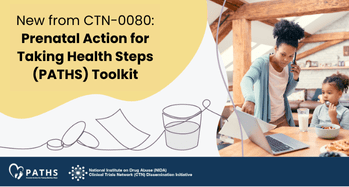
The CTN-0080 (MOMs) team has developed a set of dissemination materials around messaging for medications for opioid use disorder (MOUD) in pregnant and postpartum individual, now available on the CTN Dissemination Library website!
The Prenatal Action for Taking Health Steps (PATHS) Toolkit includes flyers, info sheets, posters, an education video, and social media images and short videos (“Reels”), all available for download and sharing.
There’s also a discussion guide that can be used to direct conversations about MOUD in pregnant/postpartum people either in a group or individual settings, as well as a set of external links and resources that can be helpful to the public.
The materials are available in two versions so far — one for the general public and one that has been culturally adapted for American Indian/Alaska Native communities.
Reducing the Risks of Fentanyl in the U.S.
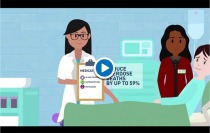
This video was created in collaboration with staff from the University of Pennsylvania Center for Addiction Medicine and Policy in response to rising rates of drug overdose deaths involving opioids. It also stresses that everyone can be a first responder by carrying naloxone. An infographic is available in English and Spanish.
Resources for Emergency Departments
- The Case for Buprenorphine Initiation in the Emergency Department: Why, When, and How? – Podcast Series
Listen and learn from nationally recognized experts in these 15-minute podcasts about the importance and effectiveness of starting buprenorphine treatment for opioid use disorder (OUD) in emergency departments. Hospital leaders receive research-backed advice on the technology tools, clinical evidence, and referral networks that support this safe and effective first-line treatment in the ED – and how this research has been translated into action.
These podcasts are available for no-cost CME credit with free registration on www.ACEP.org or through the @QIOProgramVideos YouTube channel - Opioid Use Disorder Management in the Emergency Department – Podcast
Health Care professionals learn best practices for patient-centered approaches to addressing opioid use disorder in the emergency department in this American College of Emergency Physicians podcast.
Medication Treatment Options for Methamphetamine Use Disorder
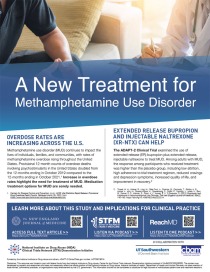
Despite the increase in methamphetamine overdose deaths in the United States between the years 2019 and 2020, effective medication treatment options for methamphetamine use disorder did not exist until now. This CME podcast describes the personal and societal burdens of methamphetamine use disorder in the United States, discusses the findings from the Accelerated Development of Additive Pharmacotherapy Treatment for Methamphetamine Disorder (ADAPT-2) clinical trial, and stresses the need for adopting these pharmacological treatment options for methamphetamine use disorder.
To learn more, please view this fact sheet. (PDF, 1.7MB)
- Learn about Initiating Buprenorphine Treatment in the Emergency Department and get step-by-step information, resources, discharge instructions, and videos.
- Buprenorphine Initiation for Opioid Use Disorders in Emergency Departments: Interactive Case Vignettes – Educational tool from The American College of Emergency Physicians
- Overdose Prevention Education for Clinicians Treating Patients with Opioids for Chronic Pain – Video from NIDA’s Center for the Clinical Trials Network
- Overdose Prevention Education for Clinicians Treating Patients for an Opioid Use Disorder – Video from NIDA’s Center for the Clinical Trials Network
- Facts for Medication Treatment for OUD – Video from NIDA’s Clinical Trials Network Dissemination Initiative
- Case Challenges in Opioid Use Disorder: Use of Medication Treatment – Clinical Trials Dissemination Initiative and Medscape
- CME Podcast – Engaging the Nursing Community in Treatment of Opioid Use Disorder
- CME Podcast – Expanding Access for Opioid Use Disorder
Products & Materials from the Blending Initiative
Blending Teams, consisting of NIDA researchers, treatment practitioners, trainers from SAMHSA’s ATTC Network, NIDA staff, and subject matter and communications experts, work closely together to develop training curricula, manuals, tools, and other resource materials based on NIDA-supported research.
- Blending Initiative Motivational Interviewing (MI) CME/CE and Patient Simulation – Practical guidance for clinicians in effective MI techniques.
- HIV Rapid Testing in Substance Abuse Treatment Programs: Resources to Support On-Site Rapid Testing (2012)
- Buprenorphine Suite of Blending Products – Including training materials for addiction professionals, resources about buprenorphine for teens, and studies on opioid dependence and using buprenorphine during opioid withdrawal.
- Motivational Incentives Package: A Proven Approach to Treatment – Three user-friendly products to assist clinicians and researchers in utilizing and applying Motivational Incentives for treating substance use among patients.
- Motivational Interviewing Assessment: Supervisory Tools for Enhancing Proficiency (MIA:STEP) (2006)
- Treatment Planning M.A.T.R.S.: Utilizing the Addiction Severity Index (ASI) to Make Required Data Collection Useful (2005)
Meetings and Conferences
An important aspect of the CTN Dissemination Initiative involves Meetings and Conferences, where addiction researchers and treatment providers collaborate and exchange knowledge. These events may offer the following:
- CME/CE credit for various health professionals
- Skill-building workshops
- Lectures for audiences ranging from addiction professionals to emergency department physicians
- Opportunities to meet leadership and members of key organizations
- Partnership and collaboration opportunities
- Resource development
Mentored Training Awards
Background on the Program:
The Mentor-Facilitated Training (MFT) Awards develop the healthcare professional trainee’s expertise in substance use disorder research dissemination activities. Through partnerships with professional healthcare organizations, awardees are paired with mentors and funded for a year to develop projects that use published research to address knowledge gaps in screening, prevention, and the management of substance use disorders. Trainees gain experience that helps shape their career paths in substance use disorder treatment or investigation to benefit their patients, colleagues, and communities. To learn more, please watch this video on the MFT program.
The MFT Awards are built on partnerships between the NIDA CTN Dissemination Initiative and professional organizations serving the addiction treatment communities. Since 2012, the MFT program has partnered with many national health care organizations, including:
- American Academy of Addiction Psychiatry (AAAP)
- American Academy of Child and Adolescent Psychiatry (AACAP)
- American Academy of Physician Assistants (AAPA)
- American Association of Colleges of Nursing (AACN)
- American Association of Nurse Practitioners (AANP)
- American College of Emergency Physicians/Emergency Medicine Foundation (ACEP/EMF)
- American College of Medical Toxicology
- National Medical Association
- Society for Academy Emergency Medicine Foundation (SAEMF)
- Society of General Internal Medicine (SGIM)
- Society of Teachers of Family Medicine (STFM)
Awardee Activities:
MFT awardees may pursue projects that focus on the screening, prevention, and the management of substance use disorders for opioids, marijuana, alcohol, tobacco, stimulants, and other substances. Awardees acquire evidence-based expertise and understanding of substance use disorders to create innovative methods to educate and provide treatment. Tools and resources developed from MFT projects include training series, workshop curricula, reference guides, websites, podcasts, and social media campaigns. These resources are disseminated through health systems, professional organizations, and communities. Awardees present their projects at annual meetings of their respective professional societies and may publish their projects.

